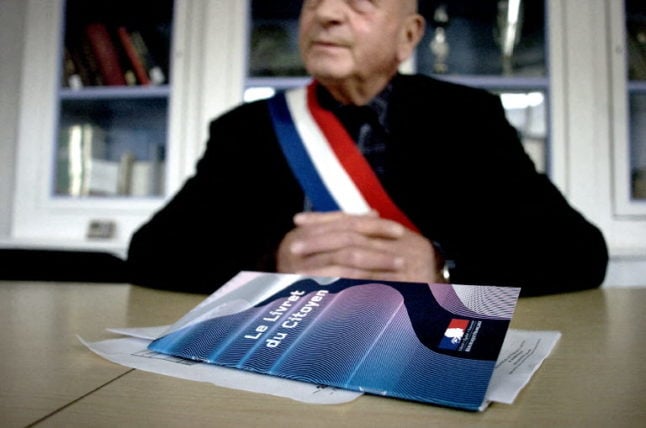There are two different avenues for applying for French citizenship – by déclaration or by décret.
The déclaration route is primarily for those who are either married to a French person or can prove family ties, while par décret is the path to citizenship taken by those who must prove several conditions, in many cases including a minimum length of residence in France.
How you apply and the documents that you need to supply will vary depend on whether you are applying by déclaration or décret, but once your dossier is submitted, the next steps are more or less the same.
How long?
The timeline can vary vastly between different préfectures, as well as whether you are applying via déclaration (typically faster) and décret (typically slower).
But the big difference is where you live, as applications are dealt with on a local level and some préfectures are speedier than others.
READ MORE: French vocabulary you need to know when applying for citizenship
The very broad average is that it takes between 18 months and two years between submitting your dossier and being accepted, but expect wide variations between different préfectures. You can consult our guide on how to apply, as well as the required documents based on your situation.
READ MORE: French citizenship: How long does it take for your application to be dealt with?
The steps for naturalisation
In 2023, the French government introduced an online platform with the aim of speeding up the process and make it more efficient.
At present this is only available to people applying by décret (through residency) those applying through marriage or family ties must continue to use the paper-based system – for now, anyway.
If you are able to use the website, once you have turned in your application on the ANEF website, you will be immediately placed onto an interactive timeline below.
This shows each of the steps for applying by décret. It will turn blue as you move along in the process.

Demande envoyée – This is the first step, which activates as soon as you send the request for citizenship.
Examen des pièces en cours – You will see this turn blue once a staff member from the préfecture begins looking over your dossier. This step is basically focused on ensuring that your documents are correct – the staff member is ensuring that they are ‘legible, usable and conform to what was requested’.
They are not assessing the application itself. For example, you might be asked to resubmit documents if the scan is out of focus, if the document is not what was requested or if a translation is not included for certain types of documents. You might be asked to submit some extra documents at this stage.
Demande déposée – This is the official moment that your application is considered ‘submitted’. French authorities will consider this the official start date of your application. It also means that any new laws that subsequently come into force – for example changing the qualifications for citizenship – should not affect your application.
The time between the first step (demande envoyée) and this step can depend greatly based on the préfecture. Some people only wait a few weeks, while others wait several months. Facebook groups can be a helpful way to get an idea, but every application is unique, so the timeline for one person may not be the same for you.
Traitement en cours – This basically means ‘processing’, and involves a staff member being personally assigned to go over your dossier thoroughly – this time they are looking at the application itself and whether you meet the criteria for citizenship.
It is at this stage that you may again be asked for extra documents, this time relating to the application itself – common examples are people being asked to supply extra documents relating to their financial status such as tax declarations or proof of income in another country.
The préfecture can reject your application at this stage if you either cannot supply the required documents or you have some other factor that disqualifies you, such as a criminal record.
Réception du récépissé de complétitude – This means that your paperwork has been verified again and deemed ‘complete’, and the next step is to wait for a summons to the interview.
According to the French Service-Public website, for naturalisation, “authorities have a maximum of 18 months from the date of issue of the récépissé to respond to an application for naturalisation (or reinstatement) of French nationality.
“This period is reduced to 12 months if you can prove that you have been ordinarily resident in France for at least 10 years on the date of issue of the récépissé. The response time may be extended once for a period of three months, but authorities must give a reason for this decision.”
Traitement en cours – This is the processing period in-between between receiving your interview date and the interview itself.
It is possible that at this point (or even before) you could be called up for an ‘enquête administrative’. This is a police or gendarme interview.
Their main goal is just to determine if your application is genuine, so they would want to see your identity documents and ask you a bit about how integrated you are in France. This is not the same thing as the main ‘entretien d’assimilation’ and not everyone has one of these – it is more common in rural areas and for people applying by déclaration (namely marriage, to check that you are genuinely married and living together).
Entretien d’assimilation – At this point, you should receive your ‘convocation’ for the interview at the préfecture.
At the interview you will be asked questions about how well you know France – from its history and culture to political and democratic structures via popular culture. Exactly what people are asked varies widely, some people report being grilled on every aspect of France and French life while others report just a quick and friendly chat.
READ ALSO What you might be asked in a French citizenship interview
It’s a good idea to revise the Livret du Citoyen, which can be downloaded for free here.
One question you will certainly be asked is why you want to become French – and here you will need to show that you truly value France and French values. Mumbling that you want a shorter passport queue is unlikely to cut it.
Traitement en cours – Now that you have done your interview, a staff member must validate that it was completed and the préfecture will write an opinion on your application.
Some of the nicer interviewers will tip you the wink then and there that you have passed, but the official process is that you are notified later whether or not the interview was satisfactory.
They pass your file onto the interior ministry, or rather the sub-directorate for access to French nationality (SDANF, Sous-direction de l’accès à la nationalité française). Regardless of the préfecture’s opinion, your file will be transmitted to SDANF.
You will receive an email informing you that you have been given a ministerial number.
It is also sent to the Service Central d’État Civil (SCEC), who will look over your dossier and begin creating your new French civil status records.
This part is time-consuming, and it is now in the hands of SDANF to go through your paperwork again and make a decision. As such, you might be asked for more documents.
Décision statuée – This is the moment that you find out whether you passed. If you are approved, then your name will be added to the electoral roll and the decree being published in the Journal Officiel.
The order somewhat depends, you might get a letter or email from the préfecture first, or you might find out by seeing your name in the JO or the electoral roll.
Later, you should receive a notification that your new French birth certificate is ready.
Cérémonie de remise du Livret – Congrats! You are now French, and you will be invited to a ceremony organised by the préfecture or town hall.
| Banner ad |
You should receive this within six months of acquiring nationality. However all the official stuff – getting a French passport or ID card for example – can be done as soon as your name appears in the JO, there is no need to wait for the ceremony.
The ceremony is optional but many people report that it’s quite an emotional moment as people from all over the world are officially welcomed to being French.
READ MORE: Can you be stripped of French citizenship?
The steps for applying by déclaration
Overall, the steps are similar to those outlined above but as of July 2024, there was still no option to apply online. As such, you likely will not be able to follow the process as carefully and will just have to wait for messages from the préfecture.
Depending on where you are applying (either in France or outside of the country), you will either send the dossier by post (lettre récommandée avec accusé de réception) or you give it in person. You can check how to do so here.
The préfecture might reach out to you during the period, perhaps to request additional documents. They might contact you by phone, so be sure to answer even if it is an unknown number.
If you sent your application by the post, which is very common for those applying by marriage inside of France, then you will receive an ‘attestation de dépot de dossier’ (confirmation your dossier has been received and is being processed).
Now, you wait to be invited for your police interview (which may involve a home visit and an interview at the station), plus a convocation for the standard interview (entretien d’assimilation), these correspondences may happen by post or phone call. Your spouse will be invited too.
During the entretien d’assimilation, they will ask questions both about your relationship (to verify that you are not in a fake marriage), as well as your integration into French society. Bring along the originals of all the documents you submitted.
After the interview, you will be given a récépissé (receipt). This acts as proof that you completed this step.
The next part is similar to the application by décret. Your file will be sent to SDANF, and you should receive a ministerial number. To check the progress of your application, you will need to email SDANF. Know the response time from the administration.
At this point, they will have one year to register your déclaration and approve your request, or two years if they initiate a process to oppose your acquisition of French citizenship.
Unlike those applying by décret, you will not be listed in the Journal Officiel, but you will be put onto the electoral roll. You can start checking that to see if your name pops up, or you can wait for a letter or email informing you that you were put on the electoral roll.
Later, you should receive a notification that your new French birth certificate is ready.
The process for applying through marriage is generally a little less rigorous, because citizenship is a ‘right’ for the spouses of French citizens – however you are only entitled to it if you can prove, with documentation, that you fulfil all the criteria.
Reader question: Are you entitled to French citizenship if you have a French spouse?



 Please whitelist us to continue reading.
Please whitelist us to continue reading.
Member comments